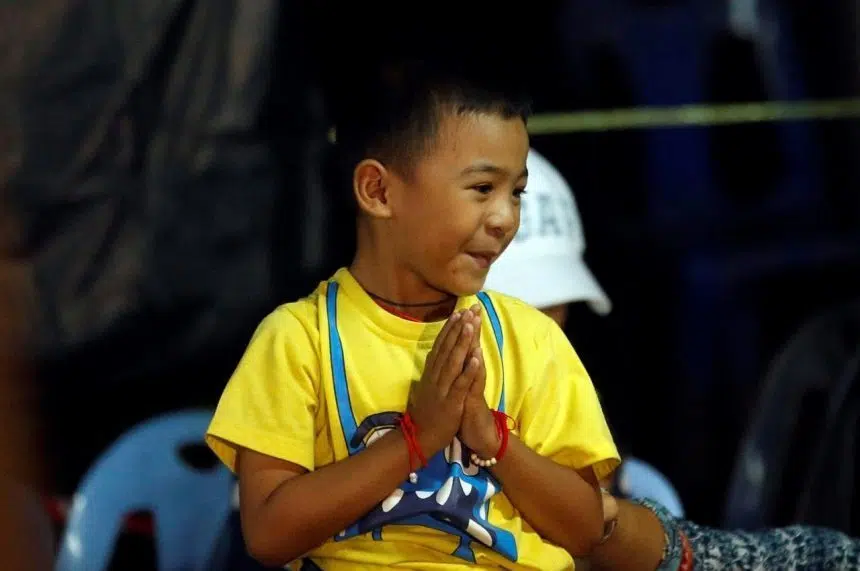MAE SAI, Thailand — A top Thai official said Tuesday that heavy rains forecast for the coming days could worsen floods in the mountain cave where 12 boys and their soccer coach were located after being missing for more than a week, forcing authorities to speed up their extraction.
The 13 were located by rescue divers late Monday night in the cave in northern Chiang Rai province during a desperate search that drew international help and captivated the nation. Officials said Tuesday that the boys, aged 11-16, and their 25-year-old coach were mostly in stable medical condition and have received high-protein liquid food.
Interior Minister Anupong Paojinda, a member of the country’s ruling military junta, said Tuesday that the boys may need to swim out using diving equipment ahead of bad weather forecast for later in the week. He said the boys would be brought out via the same complicated route through which their rescuers entered.
While efforts to pump out the floodwaters would continue, Anupong said it’s clear some areas of the sprawling cave cannot be drained and that in order to get out, the boys may need to use diving gear while being guided by two professional divers each. He conceded that if something went awry, it could be disastrous.
“Diving is not easy. For people who have never done it, it will be difficult, unlike diving in a swimming pool, because the cave’s features have small channels,” he said. “If something happens midway, it could be life-threatening.”
Video released early Tuesday by the Thai navy showed the boys in their soccer uniforms sitting on a dry area inside the Tham Luang Nang Non cave above the water as a spotlight from a rescuer illuminated their faces.
Chiang Rai provincial Gov. Narongsak Osatanakorn said the health of the boys and coach were checked using a field assessment in which red is critical condition, yellow is serious and green is stable.
“We found that most of the boys are in green condition,” he said. “Maybe some of the boys have injuries or light injuries and would be categorized as yellow condition. But no one is in red condition.”
Cave rescue experts have said it could be safer to simply supply them where they are for now, rather than attempting to have the boys dive out. That could take as long as months, however, given that Thailand’s rainy season typically lasts through October.
Family members who have kept vigil at the mouth of the cave since their ordeal began June 23 rejoiced at the news that their boys and their coach had been found.
“I want to give him a hug. I miss him very much,” said Tham Chanthawong, an aunt of the coach. “In these 10 days, how many million seconds have there been? I’ve missed him every second.”
Rescue divers had spent much of Monday making preparations for a final push to locate the missing, efforts that had been hampered much of the week by flooding that made moving through tight passageways filled with muddy water difficult.
A pair of expert cave divers from Britain found the group about 300-400 metres (yards) past a section of the cave on higher ground that was thought to be where they might have taken shelter.
In the five-minute navy video, the boys are seen wearing their soccer uniforms and are calm, curious and polite. They are also keen to get some food.
After an initial exchange in which a rescuer ascertains that all 13 are present, one of the boys asks what day it is, and a rescuer replies: “Monday. Monday. You have been here — 10 days.”
The rescuer tells them “you are very strong,” but soon the traditional reserve of Thai children toward adults breaks a bit, and one tells another in Thai, “Tell them we are hungry.”
“We haven’t eaten,” a boy says in Thai, then breaks into English: “We have to eat, eat, eat!” A fellow boy tells him they already said this, and then the rescuer assures them that “Navy SEALs will come tomorrow, with food and doctors and everything.” At the end of the video a boy asks in English, “Where do you come from?” The rescue diver replies, “England, UK.”
Narongsak said Tuesday that the missing were given high-protein liquid food, painkillers and antibiotics. He said doctors had advised giving the medicine as a preventative measure.
He said officials had met and agreed on the need to “ensure 100 per cent safety for the boys when we bring them out.”
“We worked so hard to find them and we will not lose them,” he said.
Anmar Mirza, a leading American cave rescue expert, said many challenges remain for the rescuers. He said the primary decision is whether to try to evacuate the boys and their coach or to supply them in place.
“Supplying them on site may face challenges depending on how difficult the dives are,” Mirza, co-ordinator of the U.S. National Cave Rescue Commission, said in an email. “Trying to take non-divers through a cave is one of the most dangerous situations possible, even if the dives are relatively easy.”
The British Cave Rescue Council, which has members taking part in the operation, said in a statement that “although water levels have dropped, the diving conditions remain difficult and any attempt to dive the boys and their coach out will not be taken lightly because there are significant technical challenges and risks to consider.”
Joining the British are other cave experts from around the world and teams from the U.S., Australia, China and elsewhere.
Authorities said efforts would also continue outside the cave, where teams have been scouring the mountainside in search of other entrances to the caverns below. Several fissures have been found and teams have explored some, though so far none have led to the trapped boys.
___
Associated Press journalists Grant Peck, Kaweewit Kaewjinda and Jason Corben in Bangkok contributed to this report.
Tassanee Vejpongsa, The Associated Press







